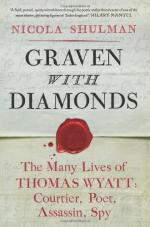|
This section contains 4,707 words (approx. 16 pages at 300 words per page) |

|
SOURCE: "Sir Thomas Wyatt's Satires and the Humanist Debate Over Court Service," in Studies in the Literary Imagination, Vol. XI, No. 1, Spring, 1978, pp. 69-79.
In the following essay, Wyatt's satires are seen as disparate portraits of courtly life.
Critical studies of Sir Thomas Wyatt's three verse epistles or satires have customarily found in them both a deeply felt indictment of the Tudor court and an equally strong vindication of the quiet, retired life. Typically, all three are said to have been "written in a mood of disillusionment with the life of the court and with the worldly arts necessary for success."1 For Patricia Thomson, these poems need to be examined against the background of Wyatt's own somewhat turbulent career at court, for they "reflect not only the shock of the courtier's disillusion, but the studied criticism of an experienced Tudor 'governor.'"2 Raymond Southall, who similarly feels that...
|
This section contains 4,707 words (approx. 16 pages at 300 words per page) |

|


